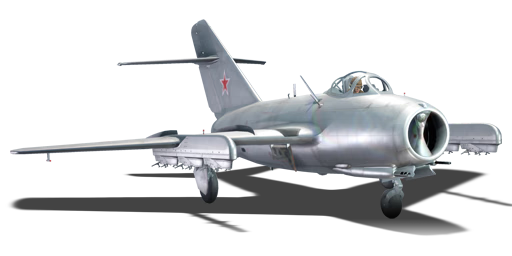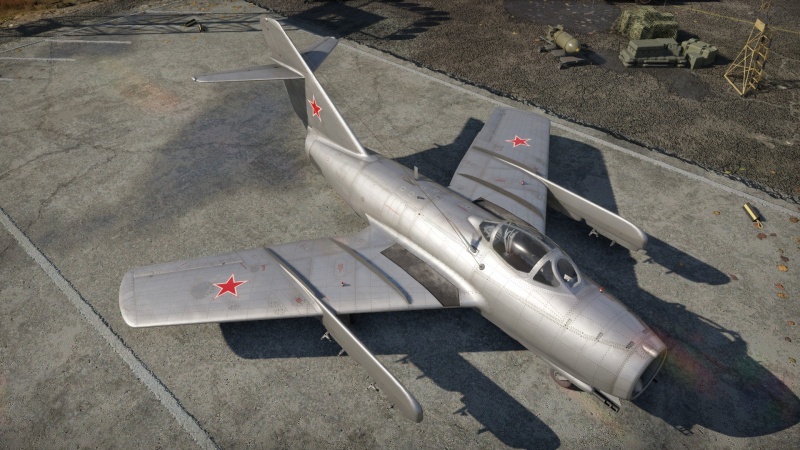MiG-15bis ISh
| This page is about the premium Soviet jet fighter MiG-15bis ISh. For other versions, see MiG-15 (Family). |
Contents
Description
The MiG-15bis ISh is a premium gift rank Soviet jet fighter with a battle rating of (AB), (RB), and (SB). It was introduced in Update 1.85 "Supersonic".
General info
Flight performance
| Characteristics | Max Speed (km/h at 0 m - sea level) |
Max altitude (metres) |
Turn time (seconds) |
Rate of climb (metres/second) |
Take-off run (metres) | |||
|---|---|---|---|---|---|---|---|---|
| AB | RB | AB | RB | AB | RB | |||
| Stock | 1,062 | 1,046 | 21.0 | 22.0 | 41.4 | 39.8 | 475 | |
| Upgraded | 1,090 | 1,076 | 20.4 | 20.7 | 59.1 | 50.0 | ||
Details
| Features | |||||
|---|---|---|---|---|---|
| Combat flaps | Take-off flaps | Landing flaps | Air brakes | Arrestor gear | Drogue chute |
| X | ✓ | ✓ | ✓ | X | X |
| Limits | ||||||
|---|---|---|---|---|---|---|
| Wings (km/h) | Gear (km/h) | Flaps (km/h) | Max Static G | |||
| Combat | Take-off | Landing | + | - | ||
| N/A | 650 | 450 | ~11 | ~6 | ||
| Optimal velocities (km/h) | |||
|---|---|---|---|
| Ailerons | Rudder | Elevators | Radiator |
| < 600 | < 700 | < 750 | N/A |
Engine performance
| Engine | Aircraft mass | |||||
|---|---|---|---|---|---|---|
| Engine name | Number | Empty mass | Wing loading (full fuel) | |||
| Klimov VK-1 | 1 | 3,768 kg | 239 kg/m2 | |||
| Engine characteristics | Mass with fuel (no weapons load) | Max Takeoff Weight | ||||
| Weight (each) | Type | 8m fuel | 20m fuel | 28m fuel | ||
| 892 kg | Centrifugal-flow turbojet | 4,100 kg | 4,598 kg | 4,930 kg | 6,100 kg | |
| Maximum engine thrust @ 0 m (RB / SB) | Thrust to weight ratio @ 0 m (100%) | |||||
| Condition | 100% | WEP | 8m fuel | 20m fuel | 28m fuel | MTOW |
| Stationary | 2,450 kgf | N/A | 0.60 | 0.53 | 0.50 | 0.40 |
| Optimal | 2,450 kgf (0 km/h) |
N/A | 0.60 | 0.53 | 0.50 | 0.40 |
Survivability and armour
Examine the survivability of the aircraft. Note how vulnerable the structure is and how secure the pilot is, whether the fuel tanks are armoured, etc. Describe the armour, if there is any, and also mention the vulnerability of other critical aircraft systems.
Modifications and economy
Armaments
Offensive armament
The MiG-15bis ISh is armed with:
- 1 x 37 mm N-37D cannon, chin-mounted (40 rpg)
- 2 x 23 mm NR-23 cannons, chin-mounted (80 rpg = 160 total)
The MiG 15 bis ISH carries multiple offensive weapons which consist of two 23 mm cannons and a 37 mm cannon. There is limited ammo on both, so eliminate enemies on the first pass if possible.
Suspended armament
The MiG-15bis ISh can be outfitted with the following ordnance:
- Without load
- 6 x 100 kg OFAB-100 bombs (600 kg total)
- 4 x 250 kg OFAB-250-270 bombs (1,000 kg total)
- 2 x 500 kg FAB-500M-54 bombs (1,000 kg total)
- 48 x S-5K rockets
- 48 x S-5M rockets
- 8 x S-1of rockets
The MiG benefits from multiple suspended weapon payloads, consisting of six x 100 kg bombs, four x 250 kg bombs, two x 500 kg bombs, 8 x S-1of or 48 x S-5K/S-5M rockets, mounted on two external mounted pods. Note that the pods are mounted at a downward-facing angle. This aircraft carries no air-to-air weapons nor any type of decoy munitions.
Usage in battles
The MiG 15's main opponents are the same as most Russian jets, mostly American and British jets, although some piston-driven aircraft will be a threat at low speeds. The MiG is not very good at turning at high speeds, as it loses speed very easily. If you intend to support your ground allies in any case, bombs are the better option. Rockets are only effective against light ground targets such as AA emplacements and aircraft on the ground. Try to avoid turning battles as the MiG is not exceptional, however, it is better than most Russian aircraft at that battle rating. Being up-tiered is not good news since Tier 6 aircraft have some access to air-to-air missiles. Here avoiding aircraft in some situations is your best bet, that said the cannons, if aimed carefully will rip an aircraft to pieces, causing critical hits or sending them back to the hangar.
Pros and cons
Pros:
- Excellent climb rate and acceleration
- Above average manoeuvrability
- Powerful main armament, especially effective against bombers
- Able to carry massive S-21 rockets
- Ground strike capability
Cons:
- Somewhat slow roll rate
- Poor controllability due to compression at high Mach numbers (> Mach 0.9)
- Inhomogeneous main armament with different ballistic characteristics can make aiming difficult
- Armament difficult to use (low velocities, low ammo and two different trajectories)
- Guns tend to spark a lot (the N-37 in particular), especially with stock belts
- Rockets are difficult to aim due to angled mounts
- Poor forward visibility in simulator, as a large canopy frame and the gunsight block the top and bottom
History
Describe the history of the creation and combat usage of the aircraft in more detail than in the introduction. If the historical reference turns out to be too long, take it to a separate article, taking a link to the article about the vehicle and adding a block "/History" (example: https://wiki.warthunder.com/(Vehicle-name)/History) and add a link to it here using the main template. Be sure to reference text and sources by using <ref></ref>, as well as adding them at the end of the article with <references />. This section may also include the vehicle's dev blog entry (if applicable) and the in-game encyclopedia description (under === In-game description ===, also if applicable).
In-game description
After World War II was over, the leaders of the USSR realized that they were behind the leading states of the world in the sphere of jet aircraft construction, most notably in the full-scale production of turbojet engines. Consequently, a delegation including the designers A. I. Mikoyan and V. Y. Klimov was sent to Great Britain towards the end of 1946. Their negotiations were successful, resulting in the purchase of two of the most advanced turbojet engines at that time: the Rolls-Royce Derwent Mk.V and the Rolls-Royce Nene I/Nene II. The British consented to sell their newest strategic designs easily enough, since they believed that the Soviet industrial/technological apparatus could not handle the mass production of sophisticated assemblies. However, very soon that the Rolls-Royce engines were launched into full-scale Soviet production under the designations RD-500 and RD-45.
The emergence of the new engines led to the creation of Soviet jet fighters able to compete with the leading models of the world. In 1947, the Mikoyan Design Bureau started the development of a front line fighter with a Nene (RD-45) turbojet engine and an airtight cockpit: the I-310 (""S""). The first S-01 prototype aircraft made its first flight on December 30, 1947, and, after working on the test results, was launched into full-scale production in 1948 under the designation MiG-15. The plane's airframe was an all-metal monoplane configuration with mid-swept wings and empennage. Thus the MiG-15 became the first production swept-wing fighter.
The MiG-15 was equipped with a RD-45F single-shaft turbojet engine rated at 2,270 kg of thrust with a double-entry centrifugal compressor. The plane's armament included a 37mm Nudelman N-37D cannon with 40 rounds and two 23mm Nudelman-Suranov NS-23KM guns with 160 rounds in total. The cannons were mounted in the forward fuselage on a lowerable carriage. Two 100-kg or 50-kg bombs could be suspended under the wings. To increase its flight range, the aircraft could carry two external fuel tanks with a capacity ranging from 250 to 600 litres.
The MiG-15 fighter was notable for its simple and reliable structure, high flight and operating characteristics, and powerful armament. Its maximum speed, rate of climb, ceiling, and flight range were the best among Soviet fighters at the time and superior to many foreign aircraft, as well.
The first production MiG-15s with RD-45F engines began to leave the factory floor in early 1949. In 1950, more advanced MiG-15bis fighters replaced them in the factory assembly lines.
Media
See also
Links to the articles on the War Thunder Wiki that you think will be useful for the reader, for example:
- reference to the series of the aircraft;
- links to approximate analogues of other nations and research trees.
External links
| Mikoyan-Gurevich Design Bureau (Микоя́н и Гуре́вич Опытное конструкторское бюро) | |
|---|---|
| Fighters | MiG-3-15 · MiG-3-15 (BK) · MiG-3-34 |
| I-225 | |
| Jet fighters | MiG-9 · MiG-9 (l) |
| MiG-15 · MiG-15bis · MiG-15bis ISh | |
| MiG-17 | |
| MiG-19PT | |
| MiG-21F-13 · MiG-21PFM · MiG-21S (R-13-300) · MiG-21SMT · MiG-21bis | |
| MiG-23M · MiG-23ML · MiG-23MLD | |
| MiG-27M · MiG-27K | |
| MiG-29 · MiG-29SMT | |
| Export/Licensed | ␗MiG-9 · ␗MiG-9 (l) |
| ◊MiG-15bis · ◔MiG-15bis · J-2* | |
| MiG-17AS · ◔MiG-17PF · J-4* · Shenyang F-5* | |
| ◊MiG-19S · J-6A* | |
| ◄MiG-21 SPS-K · ◊MiG-21MF · ◔MiG-21MF · ▄MiG-21bis · ◔MiG-21bis-SAU · ◊MiG-21bis-SAU · ◊MiG-21 "Lazur-M" · ▄MiG-21 Bison · J-7II** | |
| ◊MiG-23BN · ◊MiG-23MF · ◔MiG-23MF · ◊MiG-23MLA | |
| ◔MiG-29 · ◊MiG-29 · ◄MiG-29G | |
| *Licensed and domesticated with Chinese designations. | |
| **Unlicensed, reverse-engineered and domesticated with Chinese designations. | |
| See Also | Shenyang · Chengdu |
| USSR jet aircraft | |
|---|---|
| Bereznyak-Isayev | BI |
| Yakovlev | Yak-15 · Yak-15P · Yak-17 · Yak-23 · Yak-28B · Yak-30D · Yak-38 · Yak-38M · Yak-141 |
| Mikoyan-Gurevich | MiG-9 · MiG-9 (l) · MiG-15 · MiG-15bis · MiG-15bis ISh · MiG-17 · MiG-17AS · MiG-19PT |
| MiG-21F-13 · MiG-21PFM · MiG-21S (R-13-300) · MiG-21SMT · MiG-21bis | |
| MiG-23M · MiG-23ML · MiG-23MLD · MiG-27M · MiG-27K | |
| MiG-29 · MiG-29SMT | |
| Lavochkin | La-174 · La-15 · La-200 |
| Sukhoi | Su-9 · Su-11 |
| Su-7B · Su-7BKL · Su-7BMK · Su-17M2 · Su-17M4 · Su-22M3 | |
| Su-24M | |
| Su-25 · Su-25BM · Su-25K · Su-25T · Su-25SM3 · Su-39 | |
| Su-27 · Su-27SM | |
| Su-34 | |
| Ilyushin | IL-28 · IL-28Sh |
| Tupolev | Tu-14T |
| USSR premium aircraft | |
|---|---|
| Fighters | Krasnolutsky's I-15bis · I-16 type 28 · Zhukovsky's I-153-M62 · I-153P · I-180S · I-301 · ITP (M-1) |
| LaGG-3-4 · LaGG-3-23 · LaGG-3-34 · Dolgushin's La-7 · La-11 | |
| Eremin's Yak-3(e) · Yak-3 (VK-107) · Yak-3T · Golovachev's Yak-9M | |
| ▂P-39K-1 · ▂Pokryshkin's P-39N-0 · ▂P-39Q-15 · ▂P-40E-1 · ▂P-47D-27 · ▂P-63A-5 · ▂P-63A-10 · ▂P-63C-5 | |
| ▂Hurricane Mk IIB · ▂Spitfire Mk IXc · ▂Fw 190 D-9 | |
| Twin-engine fighters | I-29 |
| Jet fighters | Su-11 · MiG-15bis ISh · MiG-17AS · MiG-21S (R-13-300) · MiG-23ML |
| Strike aircraft | IL-2M "Avenger" · IL-2 M-82 · IL-8 (1944) · Su-6 · Tandem MAI · TIS MA · Su-8 · Tu-1 |
| Yak-38 · Su-7BMK · Su-25K · Su-39 | |
| Bombers | Po-2M · Be-6 · MBR-2-M-34 · Pe-2-205 · TB-3M-17-32 |
| ▂PBY-5A Catalina · ▂Hampden TB Mk I · ▂A-20G-30 · ▂B-25J-30 | |





